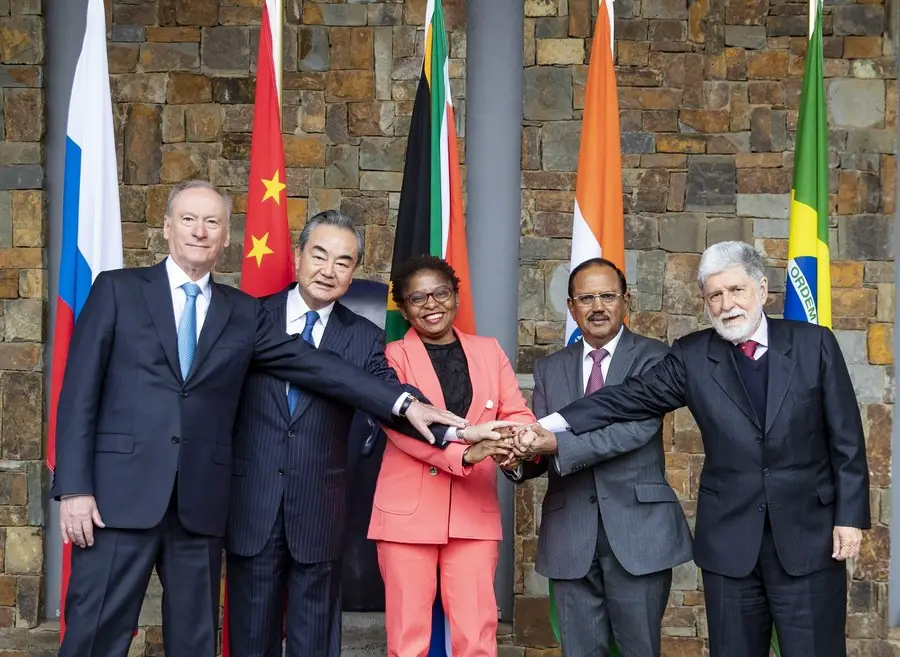By He Yin, People’s Daily
The BRICS group officially welcomed Saudi Arabia, Egypt, the United Arab Emirates, Iran, and Ethiopia as new members on Jan.1 this year, doubling its membership from 5 to 10.
This expansion has added weight to the global influence of BRICS, and the greater BRICS cooperation is expected to play a more important role in promoting world peace and development, as well as safeguarding the common interests of emerging markets and developing countries.
The greater BRICS cooperation responds to the strong desire of emerging markets and developing countries to unite and strive for self-improvement. Since its establishment in 2006, the BRICS mechanism has continuously strengthened its cohesion, solidified its foundation of cooperation, expanded its scope of cooperation, and increased its influence. The BRICS countries have become a positive and stable force for good.
In recent years, the international situation has become increasingly complex and volatile, leading to a steady rise in the attractiveness and appeal of the BRICS mechanism. More and more emerging markets and developing countries aspire to join the BRICS family.
China has been actively promoting the expansion of the BRICS membership. Chinese President Xi Jinping pointed out that BRICS should not become a closed and inward-looking group, instead it should be an open and inclusive platform to attract new members and pool new forces, which meets the practical development needs of BRICS and serves the common interests of BRICS countries.
China hosted the Dialogue of Emerging Market and Developing Countries during its BRICS presidency in 2017, for the first time expanding the scope of BRICS cooperation partners to a global level through the “BRICS Plus.” When China assumed the BRICS presidency again in 2022, BRICS countries initiated expansion process upon consensus.
The BRICS mechanism is an important cooperation platform for emerging markets and developing countries. As the mechanism continues to develop, it can play a greater role in safeguarding the interests of these countries.
Currently, unilateralism and protectionism are rising, along with the resurgence of the Cold-War and zero-sum game mentality. Hegemony and power politics pose threats to global peace and stability. Against this backdrop, emerging markets and developing countries are increasingly eager to strengthen solidarity and cooperation, and uphold fairness and justice.
The expanded BRICS family will continue to forge stronger BRICS strategic partnership, expand the “BRICS Plus” model, so as to increase the representation and voice of emerging markets and developing countries in global affairs.
The new members of the BRICS family are confident in the prospects of greater BRICS cooperation. Saudi Arabia said it will become even more prosperous after joining the BRICS mechanism. Egypt, which has always hoped to join the mechanism, hopes to further strengthen its ties with other BRICS members. The United Arab Emirates noted that its joining the BRICS cooperation mechanism marked a new chapter in its multilateral economic partnerships. Both Iran and Ethiopia believe they will benefit from the BRICS mechanism.
The greater BRICS cooperation, in line with the historical trend of building a multi-polar world, is conducive to addressing a series of major issues and challenges facing the world today. With the addition of new members, the BRICS family now has broader geographical coverage and greater scope for cooperation, which will play a greater role in promoting world peace and development, and upholding international fairness and justice.
Last November, a BRICS extraordinary virtual summit on the Palestinian-Israeli issue was hosted to coordinate positions and take relevant actions, making a voice of peace and justice. The meeting has set a positive tone for the greater BRICS cooperation.
Unlike certain countries that are obsessed with forming exclusive, small circles and blocs, BRICS cooperation does not engage in bloc confrontation. It has always been committed to promoting greater democracy in international relations and practicing true multilateralism.
Former Assistant Foreign Minister of Egypt Hussein Haridy said in an article recently published on Egyptian newspaper Al-Ahram that the expanded BRICS group is destined to play an important role in lessening the negative impact of geopolitics on multilateralism.
The greater BRICS cooperation will further strengthen the forces of world peace and development, and make global governance fairer and more equitable in a more effective manner.
China is confident in the future of BRICS cooperation and will continue to work with its BRICS partners to advocate for an equal and orderly multi-polar world and a universally beneficial and inclusive economic globalization. It will strive to achieve new accomplishments in the greater BRICS cooperation and contribute even more to the building of a community with a shared future for mankind.






